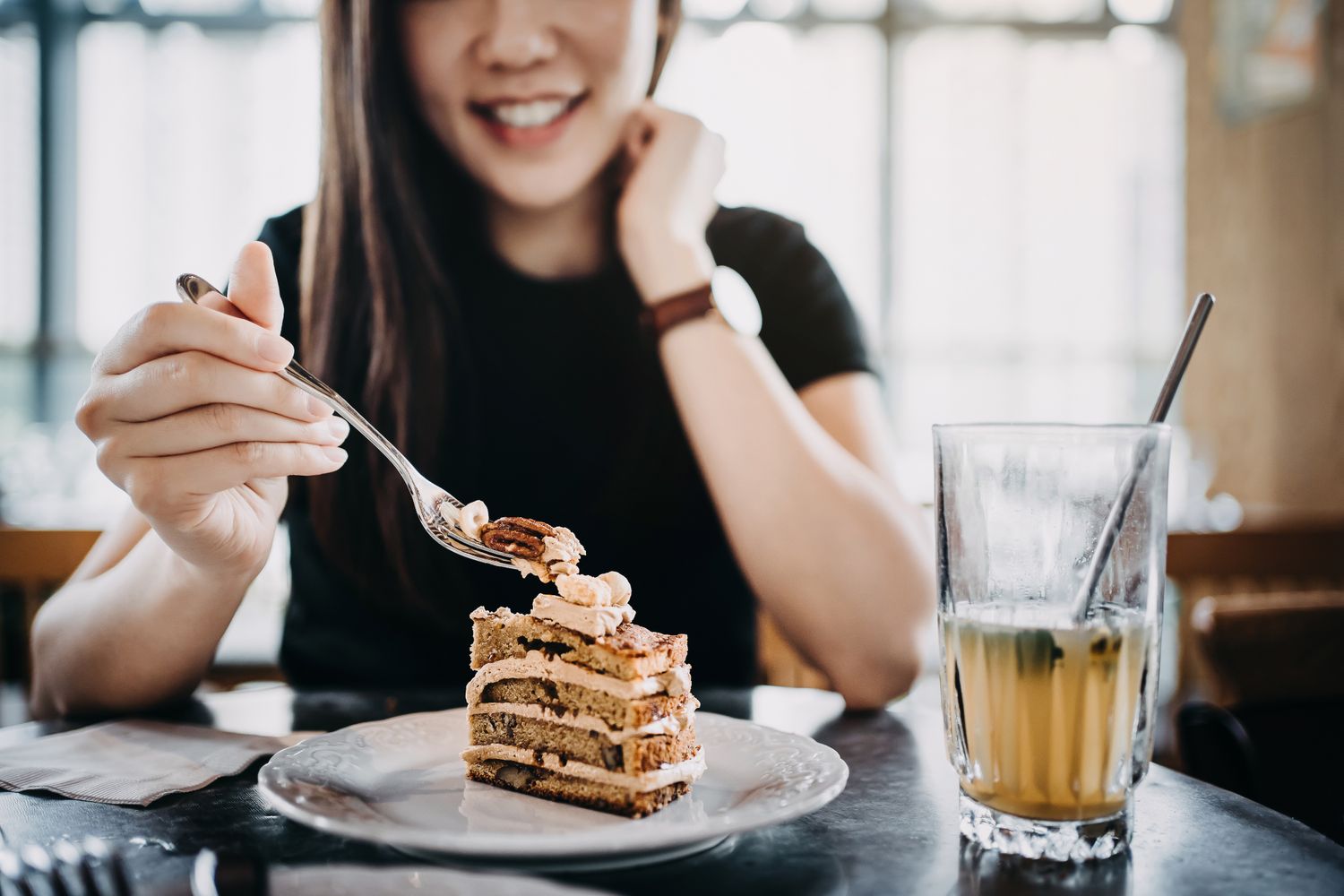It’s common to crave a sugary treat after a meal, especially in the evening. Research and experts point to several reasons why you may be experiencing a hankering for a treat and offer solutions for satisfying your cravings in a healthy way.
1. You Cut Out Too Much Sugar
When you choose to restrict a certain food or restrict your sugar intake, you may experience a phenomenon called perceived deprivation, a state in which your brain feels deprived of something even if there is no real nutritional deficiency. As a result, your brain craves that specific food.
“Cravings are a learned response,” said Anne VanBeber, PhD, RD, a professor in the Department of Nutritional Sciences at Texas Christian University.
2. Food Ads and Social Media Spark Cravings
You may also experience cravings due to external environmental cues, which are extremely prominent in today’s environment. Research has found that exposure to food cues significantly increases cravings.
“This is in advertising, social media, grocery ads, food packaging,” VanBeber said.
According to VanBeber, the physiological responses these cues activate include increased salivation, heart rate, secretion of digestive enzymes and hormones, and brain activity related to achieving a reward.
3. Sugar Activates Your Brain’s Reward System
Sugar tastes so good because it activates reward circuits in the brain and boosts the secretion of serotonin and dopamine, which are feel-good hormones.
This explains why emotional or stress eating is so common: research shows that in many people, poor mood stimulates eating high-carbohydrate, high-fat foods because they stimulate the release of endorphins.
“Having sweets at the end of a meal physically brings happiness,” VanBeber said.
However, science shows the boost is temporary, and long-term high sugar consumption has resulted in low basal dopamine levels.
4. You May Have a Blood Sugar Imbalance
When you eat an imbalanced meal, you may be left with a blood sugar spike that can ultimately cause you to crave sweets.
This is most common when you eat a carb-heavy meal without the other necessary components. Your body releases insulin in response to the carbs, but releasing too much may lead to low blood sugar and a subsequent sugar craving. And so, you consume more sugar, and the cycle repeats.
The best way to combat this is to consume balanced meals with protein, fiber, and healthy fats.
5. Your Taste Buds Want Something New
Sensory-specific satiety refers to the reduced pleasure you experience after you’ve consumed a sufficient amount of certain foods or flavors.
After eating, your body gets tired of the savory flavors. Your taste buds crave something different—usually, sweets.
“We can reduce this by incorporating sweet tastes along with sour, bitter, salty, and umami in the main part of the meal,” VanBeber said.
“This leads to eating fewer calories and feeling fuller sooner,” she added.
6. Cravings Peak at Night
Research has shown that the desire for sweets and salty snacks gradually increases throughout the day and is more prominent in the evening, said Joan Salge Blake, RDN, a dietitian and nutrition professor at Boston University.
“Research suggests that craving for a certain food may be habitual and that as the day goes on, the ability to have less self-control later in the day may be due to mental fatigue,” Blake said.
One study found that while hunger for meals typically occurred at lunch and dinner time, snack and dessert cravings increased throughout the day with less coherence with hunger.
Another study found that the body’s circadian rhythm increases cravings for sweet, starchy, and salty foods in the evenings.
How to Satisfy Your Cravings In a Healthy Way
While having a small sweet treat every now and then is perfectly fine, it’s important to be aware of your sugar consumption, especially at night.
If you’re craving something sweet but want to make a healthy choice, VanBeber said a piece of fruit is always a good choice.
Other options, according to Blake, include:
Chocolate or vanilla teaHot chocolate with skim milkSorbet made by blending frozen berries with cacao powderDIY froyo made by freezing a container of vanilla Greek yogurt
Verywell Health uses only high-quality sources, including peer-reviewed studies, to support the facts within our articles. Read our editorial process to learn more about how we fact-check and keep our content accurate, reliable, and trustworthy.
Meule A. The psychology of food cravings: the role of food deprivation. Current Nutrition Reports. 2020;9(3):251.doi:10.1007/s13668-020-00326-0
Markowitz JT, Butryn ML, Lowe MR. Perceived deprivation, restrained eating and susceptibility to weight gain. Appetite. 2008;51(3):720-722.doi:10.1016/j.appet.2008.03.017
Sun W, Kober H. Regulating food craving: from mechanisms to interventions. Physiology & behavior. 2020;222:112878.doi:10.1016/j.physbeh.2020.112878
Benton D. Carbohydrate ingestion, blood glucose and mood. Neuroscience & Biobehavioral Reviews. 2002;26(3):293-308.doi:10.1016/S0149-7634(02)00004-0
Jacques A, Chaaya N, Beecher K, Ali SA, Belmer A, Bartlett S. The impact of sugar consumption on stress driven, emotional and addictive behaviors. Neuroscience & Biobehavioral Reviews. 2019;103:178-199.doi:10.1016/j.neubiorev.2019.05.021
Qin D, Qi J, Shi F, Guo Z, Li H. Sugar addiction: neural mechanisms and health implications. Brain and Behavior. 2025;15(7):e70338.doi:10.1002/brb3.70338
Wilkinson LL, Brunstrom JM. Sensory specific satiety: More than ‘just’ habituation? Appetite. 2016;103:221.doi:10.1016/j.appet.2016.04.019
Reichenberger J, Richard A, Smyth JM, Fischer D, Pollatos O, Blechert J. It’s craving time: time of day effects on momentary hunger and food craving in daily life. Nutrition. 2018;55-56:15-20.doi:10.1016/j.nut.2018.03.048
Scheer FAJL, Morris CJ, Shea SA. The internal circadian clock increases hunger and appetite in the evening independent of food intake and other behaviors. Obesity. 2013;21(3):421-423.doi:10.1002/oby.20351

Thanks for your feedback!
What is your feedback?
Helpful
Report an Error
Other

